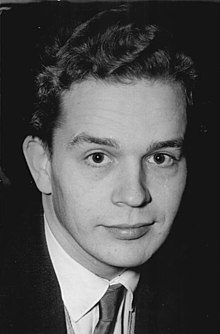Peter Hacks: Difference between revisions
m r2.7.2) (Robot: Adding eu:Peter Hacks |
No edit summary |
||
| Line 3: | Line 3: | ||
'''Peter Hacks''' (21 March 1928 – 28 August 2003) was a [[Germany|German]] playwright, author, and essayist. |
'''Peter Hacks''' (21 March 1928 – 28 August 2003) was a [[Germany|German]] playwright, author, and essayist. |
||
Hacks was born in [[Wrocław|Breslau (Wrocław)]], [[Province of Lower Silesia|Lower Silesia]]. Displaced by [[World War II]], Hacks settled in [[Munich]] in 1947, where he made acquaintance with [[Thomas Mann]] and [[Bertolt Brecht]]. Hacks then followed Brecht to [[East Berlin]] in 1955, |
Hacks was born in [[Wrocław|Breslau (Wrocław)]], [[Province of Lower Silesia|Lower Silesia]]. Displaced by [[World War II]], Hacks settled in [[Munich]] in 1947, where he made acquaintance with [[Thomas Mann]] and [[Bertolt Brecht]]. Hacks then followed Brecht to [[East Berlin]] in 1955. However, a continued cooperation between him and Brecht did not arose. From 1960 Hacks worked as a dramaturge at the Deutsches Theater (DT) in Berlin. |
||
When the staging of his play "Die Sorgen und die Macht" (1962) sparked criticism from officials, he gave up his position as a dramaturge at the DT and lived again as a freelance writer. |
|||
His success on the world stage—most notably with "Ein Gespräch im Hause Stein über den abwesenden Herrn von Goethe" (A Discussion in the Stein Home about the Absent Mr. [[Goethe]])--led to his literary acceptance within GDR and West-Germany. |
|||
Hacks was a |
Hacks was a communist and supported the East German government's 1976 expatriation of the singer [[Wolf Biermann]]. His correspondence with the communist historian [[Kurt Gossweiler]] has been published. |
||
He won the [[Deutscher Jugendliteraturpreis]]. |
He won the [[Deutscher Jugendliteraturpreis]]. |
||
{{Commons category|Peter Hacks}} |
{{Commons category|Peter Hacks}} |
||
=== Letters === |
|||
: with [[Kurt Gossweiler]], in: ''Am Ende verstehen sie es. Politische Schriften 1988–2003''; André Thiele (Editor); Berlin: Eulenspiegel, 2005; ISBN 978-3-359-01626-7; |
|||
{{Persondata <!-- Metadata: see [[Wikipedia:Persondata]]. --> |
{{Persondata <!-- Metadata: see [[Wikipedia:Persondata]]. --> |
||
Revision as of 15:56, 31 January 2012

Peter Hacks (21 March 1928 – 28 August 2003) was a German playwright, author, and essayist.
Hacks was born in Breslau (Wrocław), Lower Silesia. Displaced by World War II, Hacks settled in Munich in 1947, where he made acquaintance with Thomas Mann and Bertolt Brecht. Hacks then followed Brecht to East Berlin in 1955. However, a continued cooperation between him and Brecht did not arose. From 1960 Hacks worked as a dramaturge at the Deutsches Theater (DT) in Berlin.
When the staging of his play "Die Sorgen und die Macht" (1962) sparked criticism from officials, he gave up his position as a dramaturge at the DT and lived again as a freelance writer. His success on the world stage—most notably with "Ein Gespräch im Hause Stein über den abwesenden Herrn von Goethe" (A Discussion in the Stein Home about the Absent Mr. Goethe)--led to his literary acceptance within GDR and West-Germany.
Hacks was a communist and supported the East German government's 1976 expatriation of the singer Wolf Biermann. His correspondence with the communist historian Kurt Gossweiler has been published.
He won the Deutscher Jugendliteraturpreis.
Letters
- with Kurt Gossweiler, in: Am Ende verstehen sie es. Politische Schriften 1988–2003; André Thiele (Editor); Berlin: Eulenspiegel, 2005; ISBN 978-3-359-01626-7;
